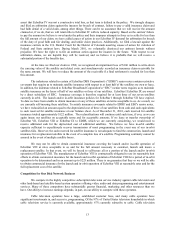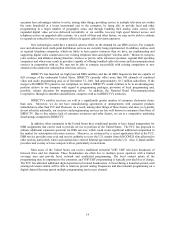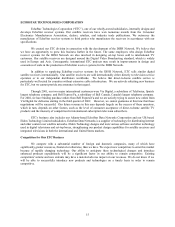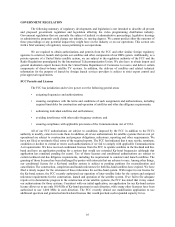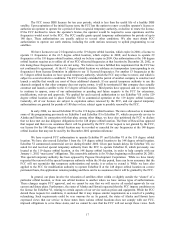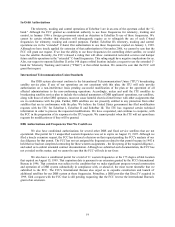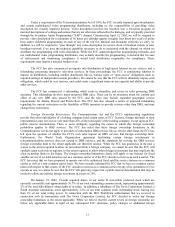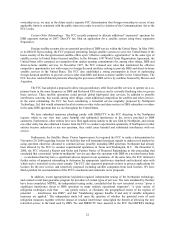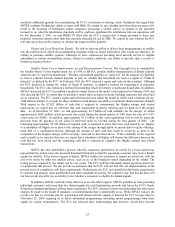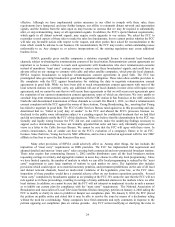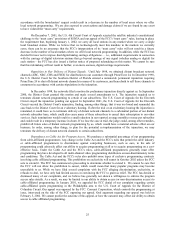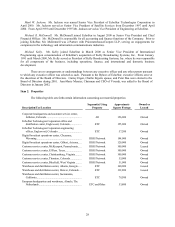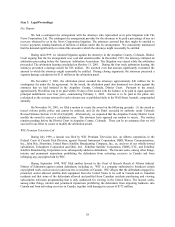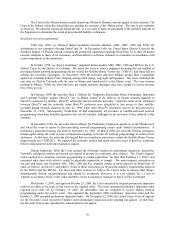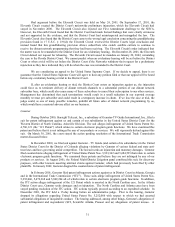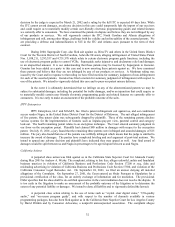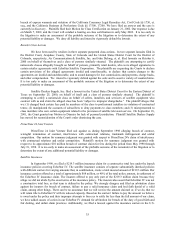Dish Network 2001 Annual Report Download - page 25
Download and view the complete annual report
Please find page 25 of the 2001 Dish Network annual report below. You can navigate through the pages in the report by either clicking on the pages listed below, or by using the keyword search tool below to find specific information within the annual report.23
constitute additional grounds for reconsidering the FCC’s conclusion on sharing, while Northpoint has argued that
MITRE confirms Northpoint’s ability to share with DBS. We cannot be sure whether and when these processes will
result in the licensing of Northpoint and/or companies proposing a similar service to operate in the spectrum
licensed to us, what the interference standards will be, and how significant the interference into our operations will
be. On December 3, 2001, we and DIRECTV filed with the FCC a request that it assign spectrum to these new
proposed terrestrial systems other than that currently allocated for use by DBS. We cannot be sure whether the FCC
will take any action on this request, or whether the request will be granted.
Distant and Local Broadcast Signals. We believe that our ability to deliver local programming via satellite
into the markets from which the programming originates helps us attract subscribers who would not otherwise be
willing to purchase satellite systems. Although we have commenced providing local network service to eligible
subscribers in various metropolitan centers, subject to certain conditions, our ability to provide such a service is
limited as discussed below.
Satellite Home Viewer Improvement Act and Retransmission Consent. The Copyright Act, as amended by
the Satellite Home Viewer Improvement Act of 1999, or SHVIA, permits satellite retransmission of distant network
channels only to “unserved households.” Whether a household qualifies as “unserved” for the purpose of eligibility
to receive a distant network channel depends, in part, on whether that household can receive a signal of “Grade B
intensity” as defined by the FCC. In February 1999, the FCC released a report and order on these matters. Although
the FCC declined to change the values of Grade B intensity, it adopted a method for measuring it at particular
households. The FCC also endorsed a method for predicting Grade B intensity at particular households. In addition,
SHVIA instructed the FCC to establish a predictive model based on the model it had endorsed in February 1999, and
also directed the FCC to ensure that its predictive model takes account of terrain, building structures and other land
cover variations. The FCC issued a report and order that does not adjust the model to reflect such variations for any
VHF stations. Failure to account for these variations could hamper our ability to retransmit distant network channels
With respect to the $7.025 billion of cash that is required to consummate the Hughes merger and related
transactions, we expect that we will meet this cash requirement in part by utilizing cash on hand as of the merger
date. As of December 31, 2001, we had approximately $2.2 billion of cash available for the merger, of which
approximately $689 million of net proceeds was raised during the fourth quarter of 2001 from the sale of 9 1/8%
senior notes by EDBS. In addition, approximately $1.5 billion of this cash requirement will be met by using the
proceeds from the purchase of our series D preferred stock by Vivendi during the first quarter of 2002. The
remaining approximately $3.325 billion of required cash, is expected to come from new cash raised by us, Hughes
or a subsidiary of Hughes on or prior to the closing of the merger through public or private debt or equity offerings,
bank debt or a combination thereof, although the amount of such cash that could be raised by us prior to the
completion of the Hughes merger will be severely restricted as described above. If the remainder of the required
cash is unable to be raised in this way, we expect that a subsidiary of Hughes will borrow the difference between the
cash that has been raised and the remaining cash that is required to complete the Hughes merger and related
transactions.
SHVIA has also established a process whereby consumers predicted to be served by a local station may
request that this station waive the unserved household limitation so that the requesting consumer may receive distant
signals by satellite. If the waiver request is denied, SHVIA entitles the consumer to request an actual test, with the
cost to be borne by either the satellite carrier, such as us, or the broadcast station depending on the results. The
testing process required by the statute can be very costly. The FCC staff has informally raised questions about how
we implement that process. We can provide no assurance that the FCC will not find that our implementation of the
process is not in compliance with these requirements. Furthermore, the FCC has identified a third party organization
to examine and propose tester qualification and other standards for testing. We cannot be sure that this decision will
not have an adverse effect on our ability to test whether a consumer is eligible for distant signals.
In addition, SHVIA could adversely affect us in several other respects. SHVIA prohibits us from providing
individual customers with more than two distant signals for each broadcasting network and leaves the FCC’s Grade
B intensity standard unchanged without future legislation. The FCC released a report recommending that only minor
changes be made to the Grade B standard, a recommendation that is unfavorable to us. While SHVIA reduces the
royalty rate that we currently pay for superstation and distant network signals, it directed the FCC to issue rules by
November 29, 2000 requiring us to delete substantial programming (including sports programming) from these
signals in certain circumstances. The FCC has released rules implementing that directive, which have become


